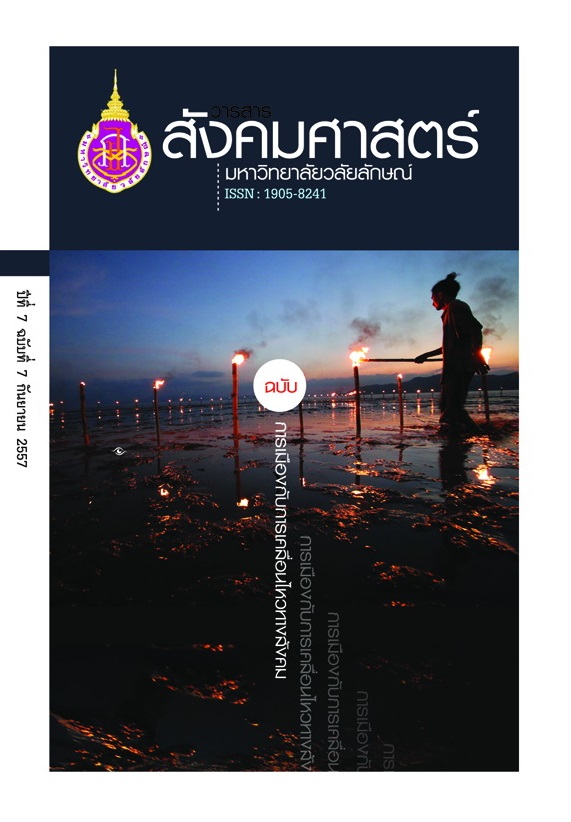“Killing for the Nation Project”: Drugs and the Concept of Human Resource in Neo-liberalism (in Thai)
Main Article Content
Abstract
This paper discusses the topic concerning the idea of Human Resource/Human Capital which has been operated in Thai society under the influence of the neo-liberal economic development. By applying the concept of biopolitics/biopower, that has been coined by Michel Foucault, this paper purposes that on the one hand, both state and the Thai society wish “human” to be brilliant, intelligent, good health ,creative etc. in order to be productive factor for economic growth. We could observe the phenomena of campaigning and promoting this idea from both state and society. On the other hand, this era has its extreme fragility: both state and society support the violence against those who tainted the “resource”, namely those who involve with the illegal drug, which has been one of the pretexts of the intense violence against them since 1987 onward; including the 3 months of the war against drug in 2003. This phenomenon can be understood by considering the reasoning/justifying produced by the Thai state and the social institution and the life verdict against those alleged drug criminal. Moreover, this condition undermines the possibility of royal pardon, regardless of individual or general pardon. The result is the execution of the drug involvement criminals under the reason that these criminals “destroy the other quality of being a good human resource”. The violence against them, therefore, lies under the very important conceptual apparatus of “human resource”.
“โครงการฆ่าเพื่อชาติ”: ยาเสพติดกับแนวคิดทรัพยากร มนุษย์ในยุคเสรีนิยมใหม่
บทความนี้ชี้ให้เห็นว่าในสังคมไทยนับตั้งแต่แนวคิด “ทรัพยากรมนุษย์” ถูกจัดวางลง ท่ามกลางการพัฒนาเศรษฐกิจตามแนวคิด เสรีนิยมใหม่ หรือจะเรียกได้ว่าเป็นยุคแห่งการ สร้างทรัพยากรมนุษย์ โดยนำแนวคิดเรื่องชีวการเมือง/ชีวอำนาจของมิเชล ฟูโก (Michel Foucault) มาร่วมอภิปราย ความเป็นไปยุค ดังกล่าวคือ ด้านหนึ่งรัฐและสังคมไทยต่าง ต้องการ “มนุษย์” ที่มีสติปัญญาความรู้ สุขภาพ ร่างกายแข็งแรงและมีทักษะการใช้ชีวิตอย่าง สร้างสรรค์ เพื่อเป็นพลังสำคัญในการพัฒนา เศรษฐกิจ ดังปรากฏการณ์การแทรกแซงและ รณรงค์มากมายที่ทั้งรัฐและสังคมต่างประสาน ช่วยเหลือกัน แต่อีกด้านหนึ่งในยุคดังกล่าว กลับเต็มไปด้วยความเปราะบางยิ่งที่ทั้งรัฐและสังคมต่างสนับสนุนให้มีการใช้ความรุนแรงอย่างเด็ดขาดต่อผู้ที่นอกจากไม่มีคุณสมบัติเป็นทรัพยากรมนุษย์แล้ว แต่กลับเข้าไปข้องเกี่ยวทำให้ ผู้มีคุณลักษณะเป็น “ทรัพยากร” ต้องเปรอะเปื้อน ลักษณะดังกล่าว เป็นเชื้อมูลสำคัญที่เอื้อไปสู่การใช้ความรุนแรงต่อผู้ที่เกี่ยวข้องกับ ยาเสพติดนับแต่ช่วงปลายพุทธศักราช 2530 เป็นต้นมาถึงปัจจุบัน รวมถึงการเกิดขึ้นของสงครามปราบปรามยาเสพติดช่วงเวลา 3 เดือนในปี พ.ศ. 2546 โดยสามารถพิจารณาจากการให้ความหมาย/ การให้เหตุผลรองรับของทั้งรัฐและสถาบันต่าง ๆ ในสังคม ตลอดจน คำพิพากษาประหารชีวิตผู้เกี่ยวข้องกับยาเสพติด อีกทั้งความเป็น ไปดังกล่าวยังเอื้อต่อการพิจารณาการพระราชทานอภัยโทษ ทั้งการ พระราชทานอภัยโทษส่วนบุคคลและเป็นการทั่วไปต่อผู้เกี่ยวข้อง กับยาเสพติดที่เป็นไปอย่างจำกัด ผลจึงนำไปสู่การประหารชีวิต ผู้เกี่ยวข้องกับยาเสพติดจำนวนหนึ่ง เพราะพวกเขาเหล่านี้ “ทำลาย ความเป็นทรัพยากรมนุษย์” ของผู้อื่น ปรากฏการณ์การใช้ความรุนแรง ดังกล่าวในสังคมไทยต่างอยู่ภายใต้ร่มเงาการทำงานของความคิด “ทรัพยากรมนุษย์” ที่เป็นโครงสร้างที่รองรับอย่างสำคัญยิ่ง
Article Details
Copyright: CC BY-NC-ND 4.0


